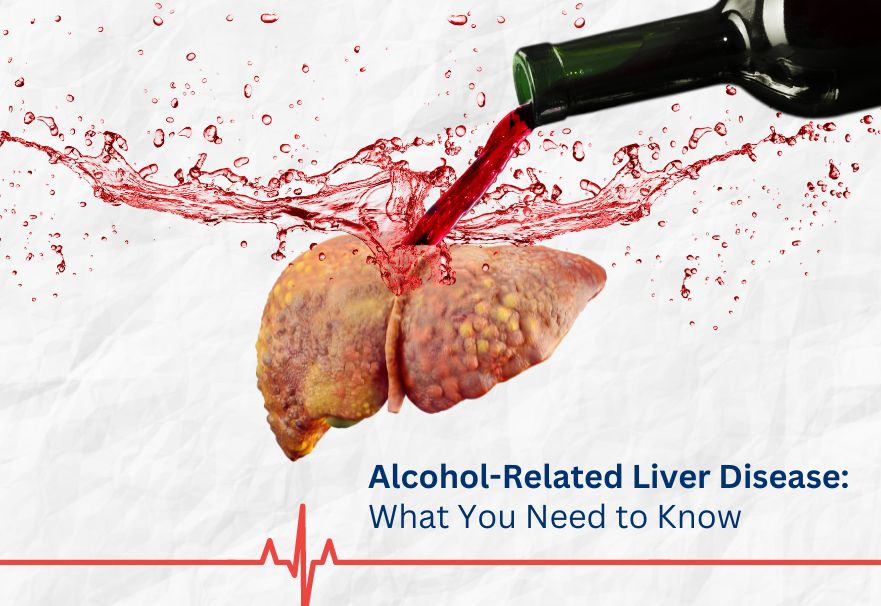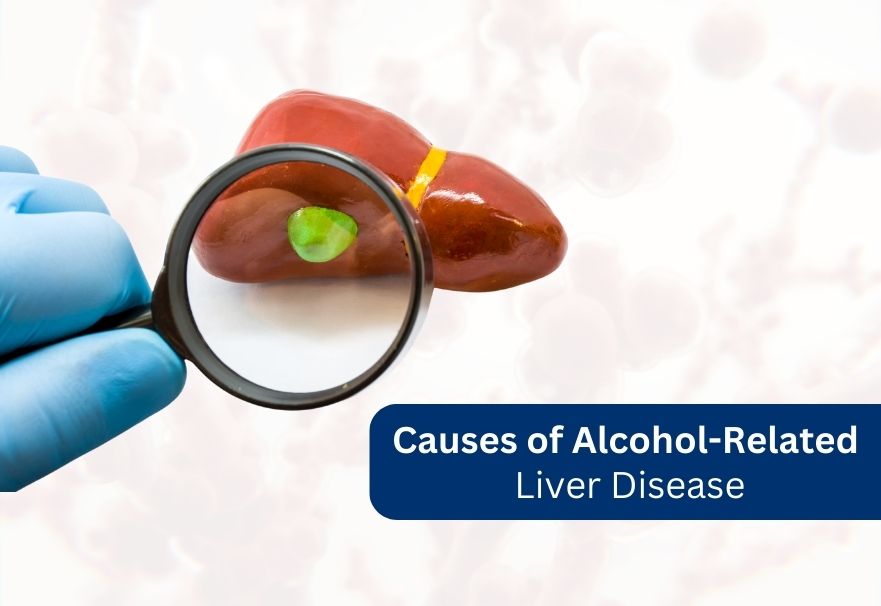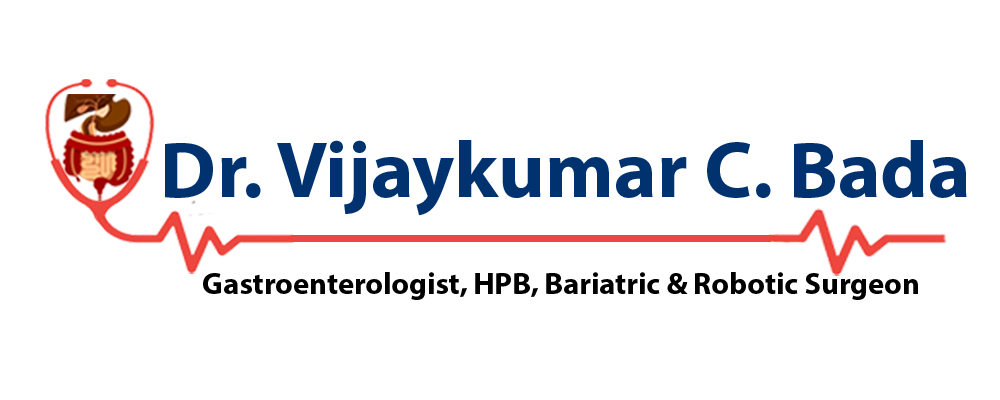Alcohol-Related Liver Disease:
What You Need to Know

What is Alcohol-Related Liver Disease?
Alcohol-related liver disease (ARLD) refers to the damage caused to the liver as a result of excessive alcohol consumption. It is one of the leading causes of liver disease and can range from mild fatty liver to severe cirrhosis. ARLD develops over time and is typically associated with long-term, heavy drinking. However, it is important to note that not all heavy drinkers will develop ARLD, as genetic factors and individual susceptibility play a role.
Types of Alcohol-Related Liver Disease
There are three main types of alcohol-related liver disease:
- Alcoholic Fatty Liver Disease (AFLD): The initial stage of ARLD, AFLD occurs when excessive alcohol consumption leads to the accumulation of fat in the liver. It is usually reversible with abstinence from alcohol.
- Alcoholic Hepatitis (AH): AH is a more severe form of ARLD characterized by inflammation and liver cell damage. It can cause symptoms such as jaundice, abdominal pain, and liver dysfunction.
- Alcoholic Cirrhosis (AC): AC is the most advanced stage of ARLD, where the liver becomes scarred and permanently damaged. It can lead to liver failure and other life-threatening complications.

Causes of Alcohol-Related Liver Disease
Excessive Alcohol Consumption
The primary cause of alcohol-related liver disease is the excessive and prolonged consumption of alcohol. The liver is responsible for metabolizing alcohol, and excessive intake puts a significant strain on this vital organ. Chronic alcohol abuse can lead to inflammation, cellular damage, and the accumulation of fat in the liver.
Genetic Factors
Have Any Question?
Are you looking for a Solution for your problem? You can call us or just drop your question here.
While excessive alcohol consumption is the main trigger for ARLD, genetic factors also play a role in determining an individual’s susceptibility to developing the condition. Certain genetic variations can make some people more prone to liver damage even with lower levels of alcohol consumption.
Nutritional Deficiencies
Poor nutrition, particularly a deficiency in essential vitamins and minerals, can exacerbate the effects of alcohol on the liver. Alcohol impairs the absorption and utilization of nutrients, leading to deficiencies in vitamins such as folate, vitamin B12, and vitamin D. These deficiencies can further contribute to liver damage and increase the risk of ARLD.
Symptoms of Alcohol-Related Liver Disease
Early Warning Signs
In the early stages of alcohol-related liver disease, symptoms may be mild or even absent. However, some individuals may experience the following early warning signs:
- Fatigue and weakness
- Loss of appetite
- Nausea and vomiting
- Weight loss
- Abdominal discomfort
- Mild jaundice (yellowing of the skin and eyes)
These symptoms can often be mistaken for other conditions or dismissed as temporary discomfort.
Advanced Symptoms
As alcohol-related liver disease progresses, more severe symptoms may manifest, indicating significant liver damage. These advanced symptoms may include:
- Jaundice (yellowing of the skin and eyes)
- Ascites (accumulation of fluid in the abdomen)
- Edema (swelling of the legs and ankles)
- Easy bruising and bleeding
- Mental confusion or changes in behavior
- Spider-like blood vessels on the skin
- Dark urine and pale stools
The presence of these symptoms requires immediate medical attention.
Diagnosis of Alcohol-Related Liver Disease
Prompt and accurate diagnosis of alcohol-related liver disease is crucial for effective management and treatment. Physicians utilize various methods to diagnose ARLD, including:
Physical Examination
During a physical examination, healthcare professionals may look for signs of liver damage, such as an enlarged liver or abdominal tenderness. They may also assess other associated symptoms and risk factors.
Blood Tests
Blood tests are essential in evaluating liver function and determining the extent of liver damage. These tests measure liver enzymes, bilirubin levels, clotting factors, and other markers of liver health.
Imaging Techniques
Imaging techniques like ultrasound, computed tomography (CT), and magnetic resonance imaging (MRI) can provide detailed images of the liver, helping to identify structural abnormalities and assess the extent of liver damage.
Liver Biopsy
In some cases, a liver biopsy may be necessary to confirm the diagnosis and assess the severity of liver disease. During a liver biopsy, a small sample of liver tissue is extracted and examined under a microscope.
Treatment Options
The treatment of alcohol-related liver disease primarily focuses on two key aspects: stopping alcohol consumption and managing complications. The specific treatment plan will depend on the stage and severity of the disease.
Lifestyle Changes
The most crucial step in managing alcohol-related liver disease is to stop drinking alcohol completely. This can help prevent further liver damage and allow the liver to heal. Additionally, adopting a healthy lifestyle, including a balanced diet, regular exercise, and weight management, is essential for overall liver health.
Medications
In certain cases, medications may be prescribed to manage specific symptoms or complications of alcohol-related liver disease. These medications may include drugs to reduce inflammation, promote liver regeneration, or manage complications such as ascites or hepatic encephalopathy.
Nutritional Therapy
Proper nutrition is vital for supporting liver function and promoting healing. Nutritional therapy involves a well-balanced diet that provides adequate protein, vitamins, and minerals. In severe cases, nutritional supplements may be recommended to address specific deficiencies.
Liver Transplantation
In advanced cases of alcoholic cirrhosis where the liver is severely damaged and no longer functional, a liver transplant may be the only viable treatment option. Liver transplantation involves replacing the diseased liver with a healthy liver from a deceased or living donor.
Prevention Strategies
Preventing alcohol-related liver disease starts with adopting healthy habits and making responsible choices regarding alcohol consumption. Here are some key strategies for prevention:
Moderate Alcohol Consumption
The best way to prevent alcohol-related liver disease is to consume alcohol in moderation or, ideally, avoid it altogether. Moderate alcohol consumption is defined as up to one drink per day for women and up to two drinks per day for men.
Healthy Diet and Lifestyle
Maintaining a healthy diet and lifestyle can significantly reduce the risk of liver disease. A diet rich in fruits, vegetables, whole grains, and lean proteins, along with regular exercise, can help protect the liver and promote overall well-being.
Regular Exercise
Engaging in regular physical activity has numerous health benefits, including improved liver function. Regular exercise helps control weight, reduce inflammation, and enhance the body’s ability to metabolize alcohol.
Complications and Prognosis
Alcoholic Hepatitis
Alcoholic hepatitis is a severe form of alcohol-related liver disease that can lead to life-threatening complications, such as liver failure and portal hypertension. Prompt medical intervention and abstinence from alcohol are crucial for improving the prognosis in cases of alcoholic hepatitis.
Alcoholic Cirrhosis
Alcoholic cirrhosis is the most advanced stage of alcohol-related liver disease and carries a significant risk of complications. These may include liver failure, portal hypertension, liver cancer, and other associated health issues. The prognosis for alcoholic cirrhosis depends on various factors, including the extent of liver damage, abstinence from alcohol, and the presence of other medical conditions
Liver Failure
In advanced stages of alcohol-related liver disease, liver failure may occur. Liver failure is a life-threatening condition that requires urgent medical attention. Liver transplantation may be the only option for individuals with end-stage liver failure.
Prognosis and Long-Term Outlook
The prognosis for alcohol-related liver disease varies depending on several factors, including the stage of the disease, the individual’s overall health, and their commitment to abstinence from alcohol. Early detection, lifestyle changes, and appropriate medical management can significantly improve the long-term outlook for individuals with alcohol-related liver disease.
Additional Information
Alcohol-Related Liver Disease Statistics
Alcohol-related liver disease is a significant public health concern worldwide. According to the World Health Organization (WHO), alcohol-related liver disease accounts for approximately 50% of all liver-related deaths globally. It is more prevalent in men than women, and the incidence tends to increase with age.
Frequently Asked Questions
Q: Can I reverse alcohol-related liver disease?
A: In the early stages of alcohol-related liver disease, such as fatty liver, abstinence from alcohol can lead to a complete reversal of the condition. However, advanced stages of liver disease, such as cirrhosis, may be irreversible, but further progression can be halted by stopping alcohol consumption.
Q: Can moderate alcohol consumption cause liver damage?
A: While moderate alcohol consumption is generally considered safe for most individuals, it can still contribute to liver damage over time. The risk is significantly higher for individuals with underlying liver diseases, genetic predispositions, or other risk factors.
Q: Can non-alcoholic fatty liver disease progress to alcohol-related liver disease?
A: Non-alcoholic fatty liver disease (NAFLD) and alcohol-related liver disease are distinct conditions. However, excessive alcohol consumption can exacerbate NAFLD and lead to the development of alcohol-related liver disease in individuals with pre-existing fatty liver.
Q: Can alcohol-related liver disease be prevented if I am a heavy drinker?
A: The risk of developing alcohol-related liver disease can be significantly reduced by quitting alcohol or reducing alcohol consumption to moderate levels. However, it is important to remember that individual susceptibility and genetic factors also play a role.
Q: Can alcohol-related liver disease be cured with medication alone?
A: Medications can help manage specific symptoms and complications of alcohol-related liver disease, but the primary treatment involves complete abstinence from alcohol. Medications alone cannot cure the underlying liver damage caused by excessive alcohol consumption.
As with any medical condition, it is essential to consult a healthcare professional for a comprehensive evaluation and personalized treatment plan.
Conclusion
Alcohol-related liver disease is a serious health condition that can have detrimental effects on the liver. By understanding the causes, symptoms, diagnosis, treatment, and prevention strategies associated with alcohol-related liver disease, individuals can make informed decisions about their alcohol consumption and take steps to protect their liver health. Remember, early detection and intervention are key to improving the prognosis and preventing further liver damage. Empower yourself with knowledge about Alcohol-Related Liver Disease with the Best gastroenterologist in Hyderabad! Join Dr Vijay Kumar C Bada to gain valuable insights and guidance on understanding, preventing, and managing this crucial health concern.
Stay Connected with
Dr. Vijaykumar C. Bada

Dr. Vijaykumar C. Bada is the best Gastroenterologist in Hyderabad city of Telangana.
- Flexible Appointments & Urgent Care
Dr. Vijaykumar C. Gastroenterologist
Design & Developed by Pointofviewer
Copyright © 2021. All rights reserved.
